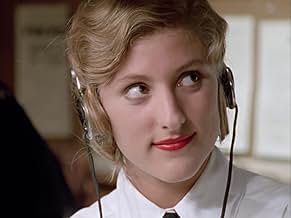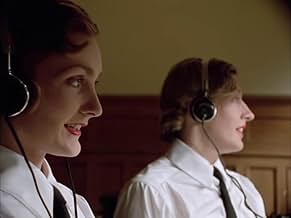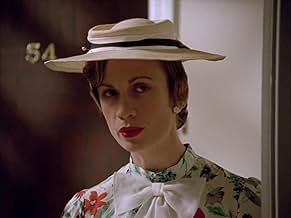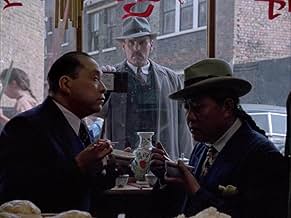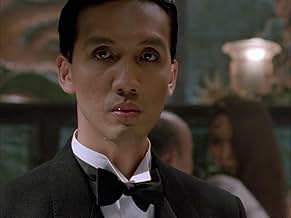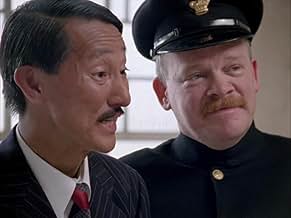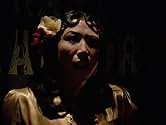The Lost Mine
- Episode aired Jan 21, 1990
- TV-14
- 50m
IMDb RATING
7.3/10
1.8K
YOUR RATING
Poirot investigates the disappearance of a Chinese-American who traveled to London to sell a valuable map.Poirot investigates the disappearance of a Chinese-American who traveled to London to sell a valuable map.Poirot investigates the disappearance of a Chinese-American who traveled to London to sell a valuable map.
- Director
- Writers
- Stars
Chris Walker
- First Officer
- (as Christopher Walker)
- Director
- Writers
- All cast & crew
- Production, box office & more at IMDbPro
Featured reviews
This time, we have Poirot trying to decipher the murder of a Chinese man in China Town. It's a story of betrayal, money, business, Opium and gambling. The Red Dragon Club is very exotic and ticks all the right stereotype boxes. You can see it's one of the older episodes, but it retains everything that's usual quality of the series, so it's amusing and enjoyable, especially with his indispensible team of Hastings, Japp and Miss Lemon.
"The Lost Mine" is one of the Agatha Christie mysteries first published in the U.S. and later in the U.K. It appeared in America in 1925 in the collection of short stories called "Poirot Investigates." It appeared in 1974 in the U.K. in the collection, "Poirot's Early Cases." This adaption for television in 1990 is the first of that kind. This is particularly relevant to a major aspect of this film. And, that is Hercule Poirot and Captain Hastings playing a game of Monopoly - the U.K. version with London street and place names. The game goes on throughout the story, between and during segments of the mystery case, which is about a murder.
Although I began reading Christie mysteries in the early 1960s, I haven't read this or most of her short stories. So, I don't know if the Monopoly game might have been added by Christie to the story for its 1974 publication in the U.K., or if it was added entirely by the playwrights for the film. If the latter, it might have been in place of another board game. That's because the London version of Monopoly didn't come out until 1936. Indeed, a close look at the board in this film shows that it is a very early edition, in excellent condition. Under the title on the board, it reads, "Patent applied for No. 3795/36."
Monopoly was first produced and marketed as a game by Parker Brothers in America in 1935. It sold the rights for European production and sales to Waddington Games the next year. The English company changed the street and place names to those in London, and first marketed that version in 1936. For instance, the high rent places of Boardwalk and Park Place on the America game edition are changed to Mayfair and Park Lane on the London board.
But the setting for this film is August 1935. When the Chinese businessman signs the hotel registry as Wu Ling, he writes the date as 8/2/35. That's a clue Poirot later points out as pegging the Chinaman as an American. The two entries in the ledger above his are dated 2-8-35 and 2nd Aug., respectively.
All of that aside, this film is not up to the usual quality of a griping and entertaining Christie mystery. The number of principals is very small and the case isn't very complex. Except for a subplot involving opium use and dens that apparently were legal in that day, the story isn't up to the level of intrigue one is accustomed to with Poirot. The red herring of the subplot is the only thing that keeps one's interest in the story. That's because of the sojourns to London's Chinatown.
Who knew that London had a Chinatown? Although it would make sense to assume that all cities with a few million population would have such. Still, one seldom would hear or read anything about a Chinatown outside the big ones of Los Angeles or San Francisco. In 1935, this would have been the original Chinatown of London. It was all but destroyed in the World War II Nazi bombing blitz. After that, Chinese establishments dispersed over London, and a smaller new Chinese section gradually formed in a more upscale area. Anyhow, so one learns in reading about it.
One other thing that helps provide some life to this story is the portrayal of the then-new police radio control network and system. Inspector Japp is only too happy to demonstrate it to Poirot and Hastings. The large room has female police employees who move toy cars along the streets of London as radio reports come in. The whole thing resembles a war room in combat.
Here are some favorite lines from the film.
Hercule Poirot, "If you put your head in the mouth of a lion, you cannot complain if one day he bites it off, huh?"
Hercule Poirot, playing Monopoly, "I will build a hotel on Fenchurch Street." Captain Hastings, "You can't build a hotel on a railway station." Poirot, "Don't be absurd, Hastings. There are plenty of hotels at railway stations." Hastings, "But, that's not in the rules." Poirot, "Well, then, Hastings, the rules are wrong."
Hercule Poirot, "The Americans always put the month before the date, Hastings." Captain Hastings, "Ah!" Poirot, "Yes, they're very backward people."
Charles Lester, "When I read about the murder, you see... this kind of thing - it's, uh, not exactly good for business." Inspector Japp, "Right now, it's not exactly good for you."
Although I began reading Christie mysteries in the early 1960s, I haven't read this or most of her short stories. So, I don't know if the Monopoly game might have been added by Christie to the story for its 1974 publication in the U.K., or if it was added entirely by the playwrights for the film. If the latter, it might have been in place of another board game. That's because the London version of Monopoly didn't come out until 1936. Indeed, a close look at the board in this film shows that it is a very early edition, in excellent condition. Under the title on the board, it reads, "Patent applied for No. 3795/36."
Monopoly was first produced and marketed as a game by Parker Brothers in America in 1935. It sold the rights for European production and sales to Waddington Games the next year. The English company changed the street and place names to those in London, and first marketed that version in 1936. For instance, the high rent places of Boardwalk and Park Place on the America game edition are changed to Mayfair and Park Lane on the London board.
But the setting for this film is August 1935. When the Chinese businessman signs the hotel registry as Wu Ling, he writes the date as 8/2/35. That's a clue Poirot later points out as pegging the Chinaman as an American. The two entries in the ledger above his are dated 2-8-35 and 2nd Aug., respectively.
All of that aside, this film is not up to the usual quality of a griping and entertaining Christie mystery. The number of principals is very small and the case isn't very complex. Except for a subplot involving opium use and dens that apparently were legal in that day, the story isn't up to the level of intrigue one is accustomed to with Poirot. The red herring of the subplot is the only thing that keeps one's interest in the story. That's because of the sojourns to London's Chinatown.
Who knew that London had a Chinatown? Although it would make sense to assume that all cities with a few million population would have such. Still, one seldom would hear or read anything about a Chinatown outside the big ones of Los Angeles or San Francisco. In 1935, this would have been the original Chinatown of London. It was all but destroyed in the World War II Nazi bombing blitz. After that, Chinese establishments dispersed over London, and a smaller new Chinese section gradually formed in a more upscale area. Anyhow, so one learns in reading about it.
One other thing that helps provide some life to this story is the portrayal of the then-new police radio control network and system. Inspector Japp is only too happy to demonstrate it to Poirot and Hastings. The large room has female police employees who move toy cars along the streets of London as radio reports come in. The whole thing resembles a war room in combat.
Here are some favorite lines from the film.
Hercule Poirot, "If you put your head in the mouth of a lion, you cannot complain if one day he bites it off, huh?"
Hercule Poirot, playing Monopoly, "I will build a hotel on Fenchurch Street." Captain Hastings, "You can't build a hotel on a railway station." Poirot, "Don't be absurd, Hastings. There are plenty of hotels at railway stations." Hastings, "But, that's not in the rules." Poirot, "Well, then, Hastings, the rules are wrong."
Hercule Poirot, "The Americans always put the month before the date, Hastings." Captain Hastings, "Ah!" Poirot, "Yes, they're very backward people."
Charles Lester, "When I read about the murder, you see... this kind of thing - it's, uh, not exactly good for business." Inspector Japp, "Right now, it's not exactly good for you."
I have always loved Poirot, and I love The Lost Mine just as much. There are a couple of clues that are so obvious on re-watch that you I agree do wonder how on earth you could've missed first time. But I have to say, that is what I loved about this episode, as well as the fact that it seemed difficult at first, but actually it is really quite simple. The story is very clever and always gripping, with a thrillingly unexpected twist. I also liked seeing how the police worked then, and the scene where Poirot makes his trip to the bank is after from the ending my second favourite scene of the episode. The Lost Mine is technically, sumptuously made with splendid photography and period detail and hauntingly scored, complete with droll, thoughtful writing. The acting is as good as can be, David Suchet I cannot praise enough, he really is the embodiment of the dapper detective. Overall, a really fine episode, one of the stronger earlier episodes to me. 9/10 Bethany Cox
A man of Chinese descent but from Burma arrives in town to conduct a business deal. Apparently, he has a map of a lost silver mine and he's planning on selling it. But the Asian guy is soon found dead and Poirot investigates his killing. Inspector Japp is ready to arrest a guy who sure seems like the killer, but Poirot isn't convinced he is the man they want and perhaps he's been set up to take the fall. So who DID commit the crime?
This is an okay episode...not bad but certainly not one that stands out in any way apart from learning that Poirot and Hastings like playing Monopoly together. The acting and sets are the usual high quality you'd expect...and it IS worth seeing despite being not especially memorable.
This is an okay episode...not bad but certainly not one that stands out in any way apart from learning that Poirot and Hastings like playing Monopoly together. The acting and sets are the usual high quality you'd expect...and it IS worth seeing despite being not especially memorable.
Han Wu Ling arrives at a top London Hotel, his business to sell a map of a mine to a bank, but when the board meet and Mr Wu Ling is not present alarm bells start ringing.
I love Poirot's frustrations with Monopoly, and his annoyance at Hastings style of play. Poirot is right, why can't you build a hotel at the Train station?
The scenes around China town look really smart, Mr Lester's scenes inside the Opium den also look harshly realistic.
As a mystery it's not the greatest, it has to be said, if you don't get it first time around something's up, but as a production it is glorious. It has a good mix of humour and drama, the ending is utterly brilliant. The performances are excellent, Anthony Bate in particular is excellent, I've always found him an actor of huge charisma, with such a strong presence. 9/10
I love Poirot's frustrations with Monopoly, and his annoyance at Hastings style of play. Poirot is right, why can't you build a hotel at the Train station?
The scenes around China town look really smart, Mr Lester's scenes inside the Opium den also look harshly realistic.
As a mystery it's not the greatest, it has to be said, if you don't get it first time around something's up, but as a production it is glorious. It has a good mix of humour and drama, the ending is utterly brilliant. The performances are excellent, Anthony Bate in particular is excellent, I've always found him an actor of huge charisma, with such a strong presence. 9/10
Did you know
- TriviaThe "war room" tracking the car for Scotland Yard is based on the RAF war rooms of WW2, right down to the cue sticks moving cars instead of airplanes.
- GoofsLord Pearson tells Poirot and Hastings that a lump of ore can be refined into "top grade twenty-four karat silver". But the karat is a unit of purity for gold, not other precious metals. Silver purity is measured in parts per thousand, with pure silver being 999.
- Quotes
Chief Inspector Japp: Charles Lester? We tried him twice this morning. He was out.
Hercule Poirot: Well, it may be of no worth...
Chief Inspector Japp: Look, be my guest. For the moment, I've got more important fish to fry.
Hercule Poirot: Well, Hastings, while the Chief Inspector is frying his important fish, let us see what we can catch, eh?
- ConnectionsReferences George White's 1935 Scandals (1935)
Details
- Release date
- Country of origin
- Official sites
- Language
- Filming locations
- Columbia Road, London, E2, England, UK(Chinatown)
- Production companies
- See more company credits at IMDbPro
- Runtime
- 50m
- Color
- Aspect ratio
- 1.33 : 1
Contribute to this page
Suggest an edit or add missing content


